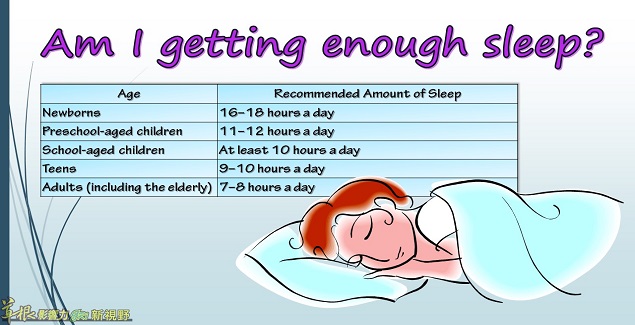
【专家评论/Dr. Chris Cheng】
There is no golden rule as to how much sleep is adequate. The amount of sleep you need each day will change over the course of your life, and sleep needs vary from person to person.
The chart below, taken from the US Department of Health and Human Services, gives general recommendations by age group:
 Sleeping more on days off and being excessively fatigued during the daytime might be signs that you aren’t getting enough sleep. Although extra sleep on days off might help you feel better, it can upset your body’s sleep–wake rhythm. Also, taking naps may provide a short-term boost in alertness and performance, but it doesn’t provide all of the other benefits of night-time sleep, particularly memory consolidation.If you routinely lose sleep or choose to sleep less than needed, your sleep burden will increase. For example, if you lose 2 hours of sleep each night, you’ll have a sleep debt of 14 hours after a week.
Sleeping more on days off and being excessively fatigued during the daytime might be signs that you aren’t getting enough sleep. Although extra sleep on days off might help you feel better, it can upset your body’s sleep–wake rhythm. Also, taking naps may provide a short-term boost in alertness and performance, but it doesn’t provide all of the other benefits of night-time sleep, particularly memory consolidation.If you routinely lose sleep or choose to sleep less than needed, your sleep burden will increase. For example, if you lose 2 hours of sleep each night, you’ll have a sleep debt of 14 hours after a week.
Bad sleep habits and long-term sleep loss will affect your health. Poor sleep is associated with diabetes, stroke, heart disease, and obesity.
Next time we will briefly discuss things that can be done to improve the quality of sleep.








